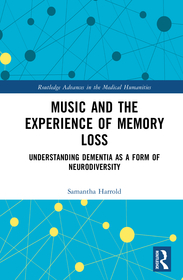
Music and the Experience of Memory Loss
Understanding Dementia as a Form of Neurodiversity
Series: Routledge Advances in the Medical Humanities;
- Publisher's listprice GBP 145.00
-
69 273 Ft (65 975 Ft + 5% VAT)
The price is estimated because at the time of ordering we do not know what conversion rates will apply to HUF / product currency when the book arrives. In case HUF is weaker, the price increases slightly, in case HUF is stronger, the price goes lower slightly.
- Discount 20% (cc. 13 855 Ft off)
- Discounted price 55 419 Ft (52 780 Ft + 5% VAT)
Subcribe now and take benefit of a favourable price.
Subscribe
69 273 Ft

Availability
Estimated delivery time: In stock at the publisher, but not at Prospero's office. Delivery time approx. 3-5 weeks.
Not in stock at Prospero.
Why don't you give exact delivery time?
Delivery time is estimated on our previous experiences. We give estimations only, because we order from outside Hungary, and the delivery time mainly depends on how quickly the publisher supplies the book. Faster or slower deliveries both happen, but we do our best to supply as quickly as possible.
Product details:
- Edition number 1
- Publisher Routledge
- Date of Publication 15 September 2025
- ISBN 9781041072652
- Binding Hardback
- No. of pages174 pages
- Size 234x156 mm
- Weight 480 g
- Language English
- Illustrations 5 Illustrations, black & white; 5 Line drawings, black & white; 3 Tables, black & white 696
Categories
Short description:
This book is a creative and critical exploration of the memory loss experience. Drawing on in-depth case studies based on primary research, interviews, approaches from music therapy, and theory from Derrida, Malabou and Royle, it explores how we might better support people living with memory loss.
MoreLong description:
This book is a creative and critical exploration of the memory loss experience. Drawing on in-depth case studies based on primary research, interviews, approaches from music therapy, and theory from Derrida, Malabou, and Royle, it explores how we might better support people living with memory loss.
Telling the story of an interpretative phenomenological analysis investigation, this innovative book focuses on conversations with ten people living with memory loss in a nursing home, alongside interviews with the pioneering dementia campaigner Wendy Mitchell. The author argues that, for residents who are living with memory loss, both the nursing home environment and the memory loss experience are uncanny. She considers how archival impulses may manifest themselves at the end of life, before exploring theories of both artistic plasticity and neuroplasticity, proposing that the memory loss state might be thought of as a kind of neurodiversity. The book concludes with suggestions for future methods that alleviate disorientation for people living with memory loss and help with acceptance, the reduction of stress, and better outcomes across multiple disciplines and practices, including music therapy, community musicianship, and the nursing home environment itself.
A better understanding of how it feels to live with memory loss is necessary for the development and improvement of practices that are designed to help the memory loss community. This book is an invaluable contribution to research around memory loss, for scholars and practitioners interested in medical humanities, dementia, social care nursing, occupational therapy, and music therapy, among others.
MoreTable of Contents:
1. Introduction, 2. Sacks, Mitchell, and the question of value, 3. Five strange stories, 4. The uncanny, the archive and the plastic brain, 5. An alternate way of being and implications for future practice
More



